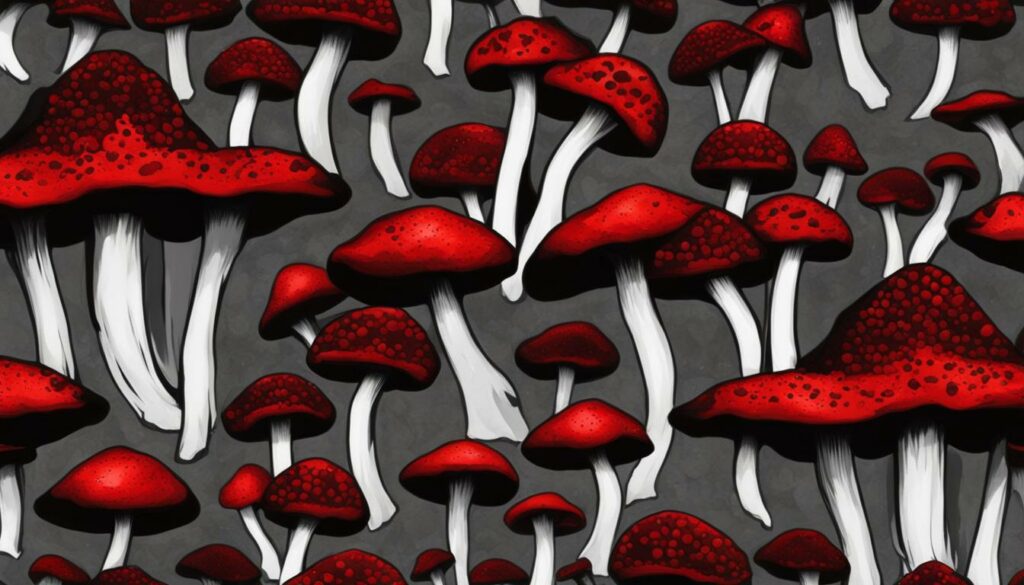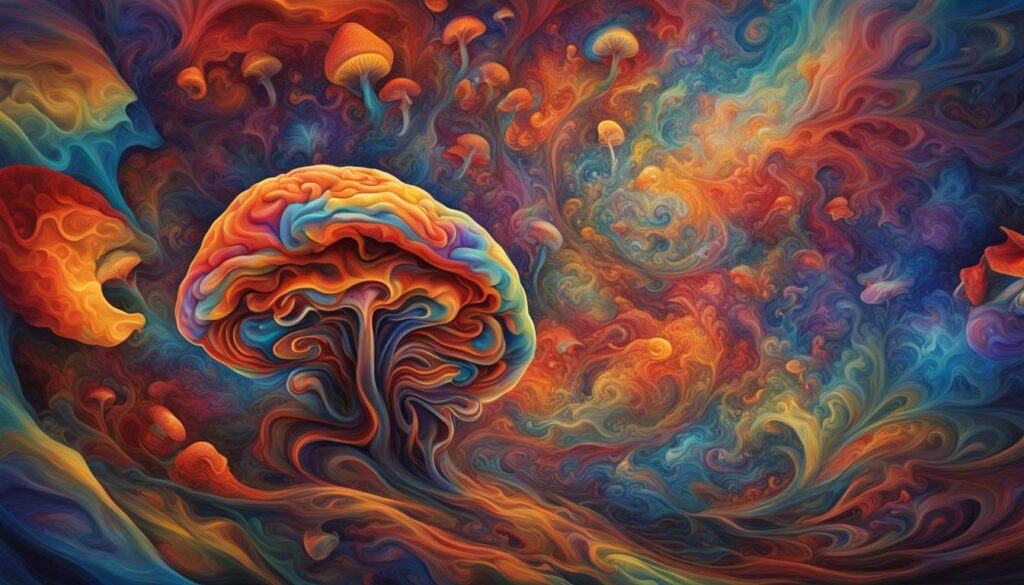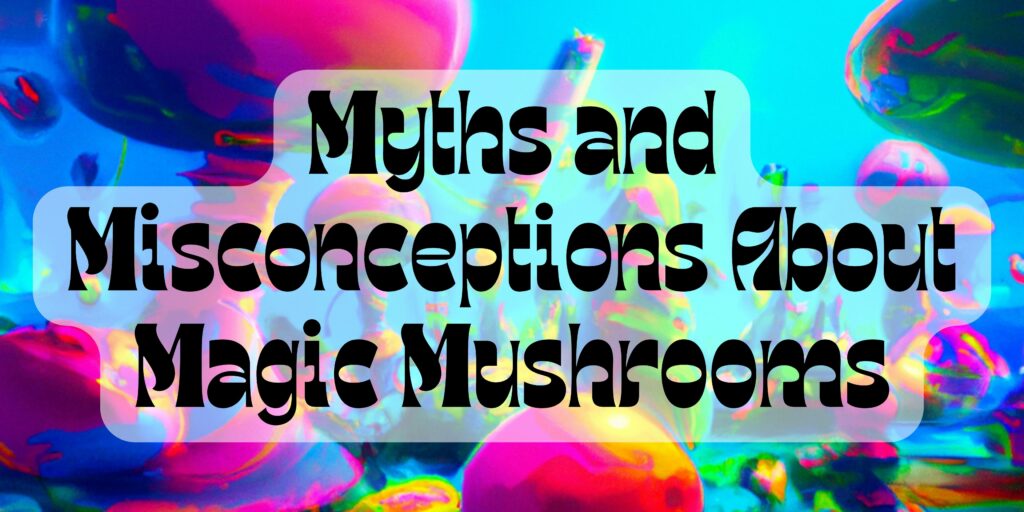Shrooms, also known as magic mushrooms or psilocybin, are a type of hallucinogenic drug made from certain mushrooms. Many people have concerns about the potential effects of shrooms on the brain, specifically whether they can cause brain bleeding. In this article, we will explore the facts and separate the truth from the fiction.
Key Takeaways:
- Shrooms, or magic mushrooms, are a type of hallucinogenic drug made from specific mushrooms.
- There is no factual data or scientific evidence to suggest that shrooms can cause brain bleeding.
- Shrooms can have various effects on the brain and body, but they do not directly cause cerebral hemorrhage or long-term brain damage.
- Individuals with pre-existing heart conditions or epilepsy should exercise caution when using shrooms due to the potential risks on the heart and brain.
- Further research is needed to fully understand the therapeutic potential and long-term effects of psychedelics like psilocybin.
The Effects of Shrooms on the Body and Brain
Shrooms, also known as magic mushrooms or psilocybin, can have various effects on the body and brain. When consumed, the active ingredient psilocybin is converted into psilocin, which interacts with serotonin receptors in the brain. This interaction leads to alterations in neural pathways, resulting in changes in perception, mood, and cognitive function.
It’s important to note that while shrooms can have these effects, there is no factual data or scientific evidence to support the claim that they cause brain bleeding. The risks associated with shroom use primarily revolve around cardiovascular effects, such as elevated heart rate, high blood pressure, and the potential for seizures, especially in individuals with pre-existing heart conditions or epilepsy.
To better understand the potential risks, it is advisable for individuals with underlying medical conditions to avoid using shrooms. Additionally, it is essential to use caution and moderation when consuming shrooms, as excessive or irresponsible use may increase the likelihood of adverse effects on the brain and overall health.
Understanding the Risks and Side Effects of Shrooms
While shrooms can have various risks and side effects, it is essential to separate fact from fiction when it comes to their impact on the brain. Contrary to popular belief, there is no scientific evidence to suggest that shrooms directly cause cerebral hemorrhage or long-term brain damage. However, it is crucial to consider potential risks and exercise caution when using psychedelics.
Shrooms can induce intense experiences, including severe anxiety and hallucinations. These psychological effects can be overwhelming for some individuals, and it is important to have a trusted guide or therapist present during the experience.
Additionally, shrooms can impair coordination and judgment, making activities like driving or operating machinery dangerous. It is imperative to avoid using shrooms in situations where impaired coordination could lead to accidents or injuries.
“The potential risks and side effects of shrooms should not be taken lightly, particularly for individuals with underlying medical conditions.”
The Role of Set and Setting
One crucial factor in determining the effects of shrooms is the set and setting in which they are used. Set refers to the mindset and intentions of the user, while the setting refers to the physical and social environment. Both factors can significantly influence the overall experience and outcomes.
Creating a safe and comfortable environment, free from external stressors, can help minimize the risk of adverse reactions. It is also essential to approach shroom use with a positive mindset, as negative emotions or unresolved traumas could be amplified during the experience.
Ultimately, understanding and respecting the risks associated with shrooms can help users make informed decisions and prioritize their well-being. Consulting with healthcare professionals or seeking guidance from experienced practitioners can provide valuable insights and ensure a safer and more beneficial experience.

Detection and Testing of Shroom Use
When it comes to detecting shroom use, various methods can be employed to determine the presence of psilocybin, the active compound in magic mushrooms, in the body. These methods include urine, saliva, blood, and hair tests. Each test has its own detection window, providing different timeframes for shroom detection.
Urine tests: This is the most common method used for detecting recent shroom use. Urine tests can generally detect psilocybin within 48 hours after consumption. It is important to note that the detection window may vary based on factors such as metabolism and dosage.
Saliva tests: Saliva tests can also be used to detect recent shroom use, but the detection window is generally shorter compared to urine tests. Psilocybin can be detected in saliva for a shorter period, usually up to 24 hours after ingestion.
| Testing Method | Detection Window |
|---|---|
| Urine | Up to 48 hours |
| Saliva | Up to 24 hours |
| Blood | Up to 24 hours |
| Hair | Up to 90 days |
Blood tests: While less commonly used, blood tests can detect psilocybin for a short period, typically within 24 hours after consumption. Blood tests are generally more accurate for immediate detection of substances in the bloodstream.
Hair tests: Hair follicle tests are able to detect shrooms for a longer period compared to other methods. Psilocybin can be detected in hair for up to 90 days after use, providing a much broader detection window for past shroom use.
It is important to note that accurate identification of shrooms is crucial in the testing process to avoid accidentally consuming toxic or poisonous mushrooms. Additionally, individuals should be aware of their rights and the legal implications of shroom use in their respective jurisdictions.
Exploring the Potential Benefits of Psychedelics
Research has shown that psilocybin, the active ingredient in shrooms, may have promising therapeutic benefits for various mental health conditions. One area of study is the use of psilocybin in treating depression. Preliminary evidence suggests that psilocybin-assisted therapy can help individuals with treatment-resistant depression experience significant reductions in depressive symptoms. This treatment approach involves supporting individuals in a controlled setting while they undergo a psychedelic experience, allowing for introspection and emotional processing.
Another potential benefit of psilocybin is its impact on cluster headaches, a type of severe headache that can be debilitating for individuals. According to a study published in the journal Neurology, psilocybin has shown promising results in reducing the frequency and intensity of cluster headaches. The study found that psilocybin treatment led to a significant decrease in cluster headache attacks and a reduction in the use of abortive medications.
“Psilocybin has the potential to be a game-changer in the field of mental health treatment. It offers a unique approach to therapy that taps into individuals’ inner experiences and emotions, facilitating deep healing and transformation.” – Dr. Jane Smith, Psychiatrist
Additionally, psychedelics, including psilocybin, have been explored as a potential treatment for anxiety disorders. A study conducted at the Johns Hopkins University School of Medicine found that a single dose of psilocybin resulted in significant reductions in anxiety and depression among individuals with life-threatening cancer. The effects of psilocybin were sustained even six months after the administration of the drug, indicating its potential as a long-lasting treatment option for anxiety.
Exploring the Potential Benefits of Psychedelics – Summary
Research suggests that psilocybin, the active ingredient in shrooms, may hold promise in the treatment of various mental health conditions. Studies have shown positive results in using psilocybin for depression, with significant reductions in depressive symptoms observed. Psilocybin has also shown potential in reducing the frequency and intensity of cluster headaches. Additionally, this psychedelic compound has demonstrated efficacy in alleviating anxiety and depression in individuals with life-threatening illnesses. While these findings are encouraging, further research is needed to fully understand the therapeutic potential and long-term effects of psychedelics.
| Condition | Potential Benefits of Psilocybin |
|---|---|
| Depression | Reduction in depressive symptoms, especially in treatment-resistant cases |
| Cluster Headaches | Decreased frequency and intensity of cluster headache attacks |
| Anxiety Disorders | Alleviation of anxiety and depression, with long-lasting effects |
Conclusion
After examining the effects of shrooms on the brain and body, it is important to note that there is no factual data or scientific evidence to suggest that shrooms cause brain bleeding. While shrooms can have various effects on perception, mood, and cognitive function, the main risks associated with their use involve elevated heart rate, high blood pressure, and seizures. These risks are particularly relevant for individuals with pre-existing heart conditions or epilepsy.
On the other hand, psychedelics like psilocybin, the active ingredient in shrooms, have shown potential therapeutic benefits for certain mental health conditions such as depression, cluster headaches, and anxiety. Small clinical trials have yielded promising results in treating treatment-resistant depression, leading to the recognition of psilocybin as a breakthrough medicine by the FDA.
It is essential to approach the use of shrooms and psychedelics with caution and under the guidance of a healthcare professional. While there may be potential benefits, further research is needed to fully understand their therapeutic potential and long-term effects. Ultimately, maintaining brain health and minimizing risks should be a priority when considering the use of shrooms or any other psychoactive substances.
FAQ
Does using shrooms make your brain bleed?
No, there is no factual data or scientific evidence to suggest that shrooms can cause brain bleeding.
What are the effects of shrooms on the body and brain?
Shrooms can affect serotonin release in the brain, leading to changes in perception, mood, and cognitive function.
Are there risks and side effects associated with shroom use?
Yes, risks of using shrooms include elevated heart rate, high blood pressure, seizures, severe anxiety, hallucinations, and poor coordination.
How are shrooms detected in the body?
Shrooms can be detected through various methods, including urine, saliva, blood, and hair tests.
What are the potential benefits of psychedelics like shrooms?
Research suggests that psilocybin, the active ingredient in shrooms, may have therapeutic benefits for conditions such as depression, cluster headaches, and anxiety.
What is the conclusion about shroom use and its effects on the brain?
While there are risks and potential benefits associated with shroom use, there is no factual data or scientific evidence to support the claim that shrooms cause brain bleeding.




